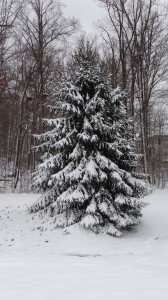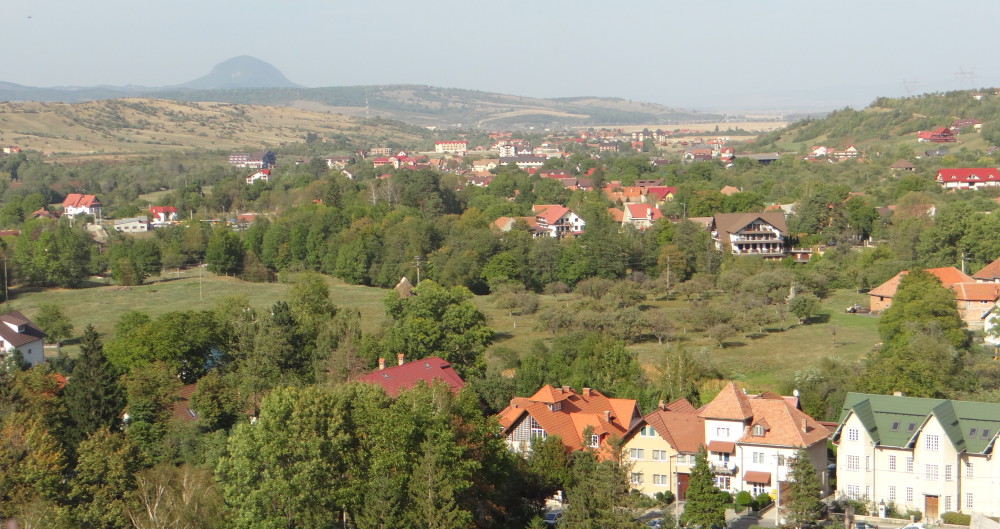 Photo: Ileana Johnson 2014
Photo: Ileana Johnson 2014
We had crossed the Allegheny Mountains, driving through a rock tunnel, speeding by changing wintry landscapes, bald trees, and still wind turbines dotting the Pennsylvania sky like giant spiders. After seven hours we made it to Scott’s boyhood home.
As huge snowflakes started dancing in the air, Ray opened up his memory bag of childhood stories. The first snow of the year was beginning to stick to the ground and the drab Ohio landscape was turning into a winter wonderland. But this gentle snow blowing from Lake Erie was just a fuss when compared to blizzards past.
It was 1950 and a monster snowstorm had buried the family up to their collective waist in fluffy whiteness. The small Medina Hollow in West Virginia was far from the maddening world of civilization but this time it resembled a lunar white desert. The roads were inaccessible for an entire week before bulldozers from the county showed up to free them from complete and utter isolation.
The feeling of despair never entered the minds of these resilient , intrepid, and self-sufficient country folk who used the Sears and Roebuck catalog as toilet paper and an outhouse dangling over the creek. Sometimes it was washed away by the swollen waters and had to be salvaged from the mud downstream and drug back to its stilts.
The cows were trapped in the shed when huge snow banks slid off the roof and closed off the only possible exit and entrance to feed and water the cows – their source of milk, butter, and cheese. The boys dug a tunnel through the snow to get the Holsteins out to the water.
The fact that they were cut off from the world by miles and tons of snow did not frighten them. They only went to the store in the nearby town of Ripley once a month to buy salt, flour, coffee, and sugar – everything else they grew and canned themselves. They had no refrigeration and electricity; a building dug into the hill, well-insulated with 8 inch walls of sawdust, kept everything cold and well-preserved. Apples, pears, potatoes, and onions were covered with straw. The milk was kept fresh in the spring. The flowing water was the magical place that sustained life – it was their cooler, fishing hole, the water source for animals and humans, and their Saturday bathtub before church.
In his typical West Virginia brogue, Ray reminisced about the yearly ritual of breaking the soil, planting the garden, weeding it, watering it, and the pig they always butchered on Thanksgiving Day. They stayed up all day and half the night, up to their elbows in blood, meat, and guts. “We saved everything but the squeal and we would have saved it too if we could have caught it. And we cleaned the guts in the river and made sausage sleeves out of them. We even used the pig’s tail to grease the griddle.”
The men dipped the hogs in a barrel to scald the hair off of them and then laid them on a sled, saved the liver, the heart, and other parts to make sausages or fry them. I wondered why they did not take a blow torch to singe the pig’s hair like my Grandpa used to do at Christmas time when he butchered the family’s hog. But then again, I always found hairs in the pig’s hide when I was trying to chew Grandpa’s specialty head cheese.
The large family survived during spring and summer by growing vegetables, eating unwashed tomatoes right out of the patch and raising chicken and collecting eggs. When it came time to cook a chicken, they would hang it live on the clothes line and cut its head off to keep it from flopping around and bruising the meat.
“It was not easy then, that’s for sure,” he said pensively. “We did not go to town much, we sold some eggs, we sold cream from Jersey and Holstein cows’ milk, but we did not buy much.”
They made sauerkraut in steeping barrels, stomping salted cabbage with their feet. When the sauerkraut was ready, they washed the salt off. “We did not know any better – that was normal to us.”
Every morning all kids had to get up at 4:30 a.m. and do their chores first before they went to school. Out in the middle of a field, they drank water from the creek and used nature’s bathroom, with special markers for the spot, no sophistication or hygiene worries.
Many kids dropped out of school too soon but Ray’s brothers stayed through 12th grade because their parents stressed the importance of school, “reading, writing, and Route 21.” Route 21 took many kids out of West Virginia to the “promised land” in Ohio in search of jobs. Medina was so small it only had a grocery store and a church, no chance for employment. Ripley was the big city with one traffic light.
Some kids were so poor, they brought raccoon sandwiches to school. Parents sent them to school just to get them out of the house until they got in fights and tried to beat the teacher and the cops took them back home.
Kids wore overshoes to handle the deep mud. When the school bus would get stuck in spite of the spare gravel on the road, children had to get out in ankle-deep mud and extricate the bus by pushing it out of the ruts. Nowadays there would be a lawsuit if kids pushed the bus.
It’s a wonder Joan married Ray after seeing all the spitting, tobacco and snuff-chewing men in the main square by the Courthouse. People slept with their dogs in bed and the pig underneath the bed because winters were so fierce and cold. Ray’s uncle was considered rich by most area residents because he owned a jewelry store in Ripley, trading watches.
Joan, Ray’s wife, a city girl from Ohio, was appalled how people lived in West Virginia. She must have loved Ray very much to stick around for 55 years. And Ray’s economical lifestyle became their trademark. Living simply, God, and family remained their guiding light.
Copyright: Ileana Johnson 2014
ILEANA JOHNSON
American By Choice
